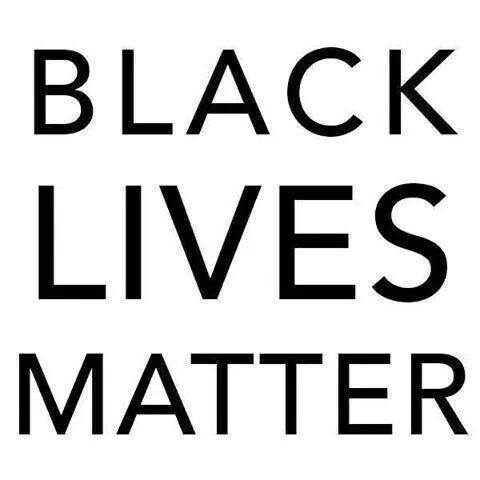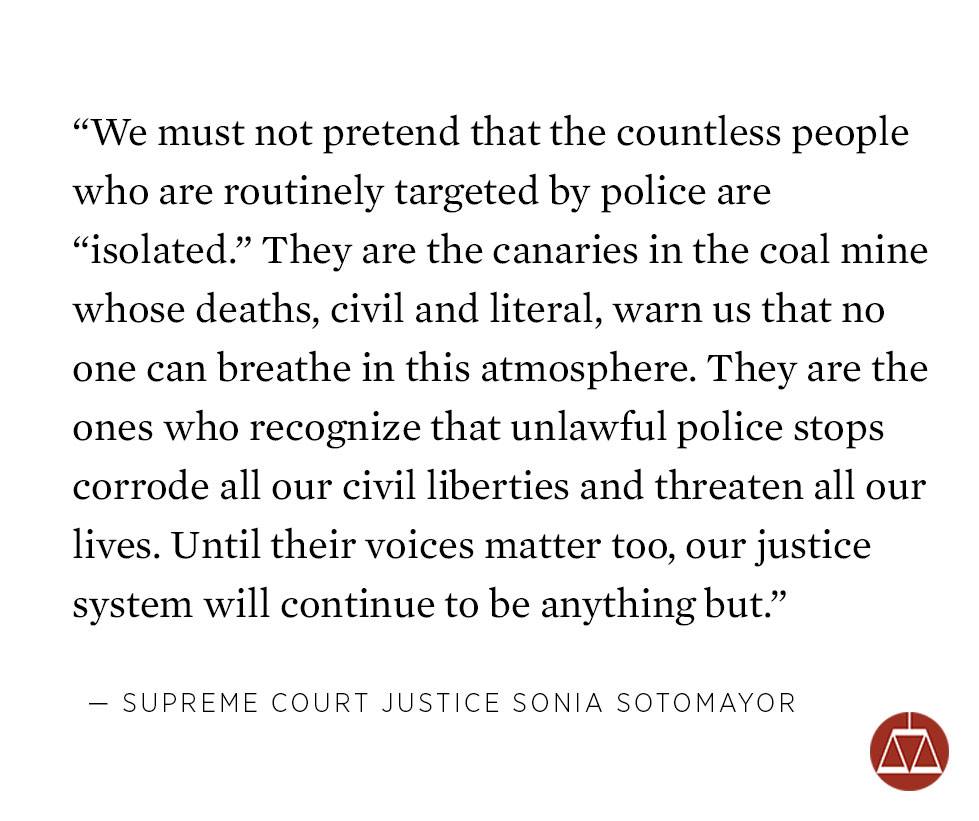I can’t watch the latest videos of police murdering black men. I feel that I should watch them, to bear witness. But… the depressing regularity of these videos threatens to engulf me in despair. So, I am not watching the murders of Alton Sterling and Philando Castile.
Instead, I will write a few words –Â expressing sentiments I’ve shared before and that others have expressed more eloquently.
 Let’s start with three words: black lives matter. If you are tempted to respond “all lives matter,” please don’t. Of course all lives matter. But all lives are not equally at risk. Black lives are much more susceptible to being cut short – by police, by stand-your-ground enthusiasts, by others. And that’s why we need to say black lives matter, but we don’t need to say all lives matter. If I see red flashing lights in my rear view mirror, and a member of the police signaling me to pull over, I do not fear for my life. I am calm because I am white. When a person of color sees those red flashing lights, his or her experience tends to be quite different. Hundreds of years of brutalization at the hands of the law can make a non-white person view representatives of that law more warily.
Let’s start with three words: black lives matter. If you are tempted to respond “all lives matter,” please don’t. Of course all lives matter. But all lives are not equally at risk. Black lives are much more susceptible to being cut short – by police, by stand-your-ground enthusiasts, by others. And that’s why we need to say black lives matter, but we don’t need to say all lives matter. If I see red flashing lights in my rear view mirror, and a member of the police signaling me to pull over, I do not fear for my life. I am calm because I am white. When a person of color sees those red flashing lights, his or her experience tends to be quite different. Hundreds of years of brutalization at the hands of the law can make a non-white person view representatives of that law more warily.
To say the least.
 As Jesse Williams observed a couple of weeks ago, “we know that police somehow manage to deescalate, disarm and not kill white people every day.”
As Jesse Williams observed a couple of weeks ago, “we know that police somehow manage to deescalate, disarm and not kill white people every day.”
Or, as Claudia Rankine writes,
because white men can’t
police their imagination
black men are dying
If you haven’t read her Citizen or watched Williams’ speech, please take the time to do so.
I don’t for a minute believe that adding my words to their (far more eloquent) words will end police brutality, or transform America’s profoundly racist system of justice. Did the oxymoronic coupling of those last four words pass you by? Let’s revisit them: racist system of justice. In other words, it’s a system of justice which is not just. Until it is not racist, it is also not justice. This is why Williams also said, “we are going to have equal rights and justice in our own country or we will restructure their function and ours.”

While I do not believe that my individual words will make a difference, I do believe that if enough people speak up, we can change the system, move it closer to justice.
I also believe that, as the primary beneficiaries of white supremacy, it is white people’s responsibility to end white supremacy. Stay with me here, fellow white people, and I’ll explain what I mean.
As a white person, I am a direct beneficiary of American racism. Every day. Let’s start with the fact that I have never been the target of racism. I’ve never been asked why I speak so “white.” Nor have I ever been asked to speak for all white people. While shopping, I’ve never been tailed by a store detective. My job application has never been passed over because my name looked “ethnic.” And red flashing lights in my rear view mirror do not make me mortally afraid. I could write a much longer list, but my point is that the unearned privileges of whiteness accrue over time. For non-white people, the penalties and their attendant psychic stresses also accrue over time. In other words, white supremacy not only grants me advantages; it actively penalizes non-whites. Every day.
I say this because a lot of white people fail to realize that you don’t have to actively support white supremacy in order to be a beneficiary of white supremacy. All white Americans are beneficiaries of white supremacy, whether they want to be or not. Our privilege conveniently conceals itself from us, and so we don’t notice our unearned advantages. As a result, we also don’t notice that those privileges are built on the oppression of others.
In other words, recognizing white privilege is not an occasion for hand-wringing or white guilt. It is instead an occasion for recognizing that whiteness makes all white people complicit in a system that disenfranchises, terrorizes, and murders people of color. Yes, we whites can and should mourn the loss of yet another black person. But we also need to ask ourselves what it feels like to be beneficiaries of the system that murdered Alton Sterling, Philando Castile, Freddie Gray, Sandra Bland, Tamir Rice, Rekia Boyd, Eric Garner, Michael Brown, and so many others. As Naomi Murakawa puts it, rather than trying to imagine that you can feel black pain, you should instead ask yourself what it feels like to live in “a country that incarcerates a greater proportion of its citizens than any nation in the world, and that has built an elaborate system of cages that actually does cage black people… What does it feel like to be on the side of that where I pay taxes for that, and the defense happens mostly in my name?”
Start there. Start with recognizing your complicity. And then act.
Further reading
- James Baldwin, “A Talk to Teachers” (originally published in The Saturday Review, 21 Dec. 1963). “any Negro who is born in this country and undergoes the American educational system runs the risk of becoming schizophrenic. On the one hand he is born in the shadow of the stars and stripes and he is assured it represents a nation which has never lost a war. He pledges allegiance to that flag which guarantees “liberty and justice for all.” He is part of a country in which anyone can become president, and so forth. But on the other hand he is also assured by his country and his countrymen that he has never contributed anything to civilization — that his past is nothing more than a record of humiliations gladly endured.”
- Britt Bennett, “White Terrorism Is as Old as America” (New York Times, 19 June 2015). “This is the privilege of whiteness: While a terrorist may be white, his violence is never based in his whiteness. A white terrorist has unique, complicated motives that we will never comprehend. He can be a disturbed loner or a monster. He is either mentally ill or pure evil. … A white terrorist is anything that frames him as an anomaly and separates him from the long, storied history of white terrorism.”
- Ta-Nehisi Coates, “Reparations for Ferguson.” (The Atlantic. 18 Aug. 2014). “The destroyers of your body will rarely be held accountable. Mostly they will receive pensions.”
- Ta-Nehisi Coates’ “The Case for Reparations” (The Atlantic, 21 May 2014). Long and well worth your while.
- Michael Eric Dyson, “What White America Fails to See” (New York Times, 7 July 2016). “The problem is you do not want to know anything different from what you think you know…. Whiteness is blindness. It is the wish not to see what it will not know.”
- David Graham, “The Second Amendment’s Second-Class Citizens” (The Atlantic, 7 July 2016). “The two shootings give a strong sense that the Second Amendment does not apply to black Americans in the same way it does to white Americans.”
- Sally Kohn, “This is what white people can do to support #BlackLivesMatter” (Washington Post, 6 Aug. 2015).
- Chuck Wendig, “I Am a Racist and a Sexist and Probably Some Other —Ists, Too.” (Terrible Minds, 23 Nov. 2014)
- Dan Zanes, “Be Less Racist: 12 Tips for White Dudes, by a White Dude” (The Mashup Americans, n.d.)
Related posts (on this blog)
- Ferguson: Response & Resources (24 Aug. 2014)
- The Archive of Childhood, Part 2: The Golliwog (13 Jan. 2015)
- #BlackLivesMatter: A Twitter Essay (3 Dec 2014)
- Regarding the Pain of Racism (4 April 2015)
- On Reading the Expurgated Huck Finn; or, Why We Should Teach Offensive Novels (17 Oct. 2014)
- Was the Cat in the Hat Black? (22 June 2014)
- ‘The Boundaries of Imagination’; or the All-White World of Children’s Books, 2014Â (17 Mar. 2014)
- Huckleberry Finn, Tom Sawyer, and Offensiveness (5 Jan. 2011)
- Can Censoring a Children’s Book Remove Its Offensiveness? (19 Sept. 2010)

Pingback: Links I Loved Last Week 7/10/16 | the dirigible plum
Tara L Gilson